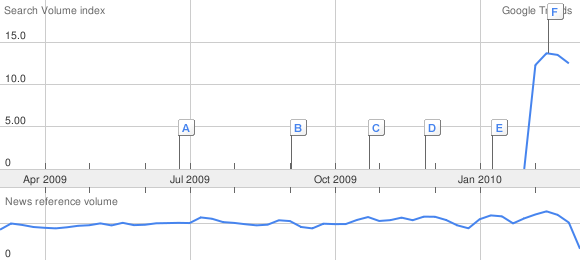Link:
https://dannyman.toldme.com/2010/06/03/sweethearts/
Boyfriend? Girlfriend? Fiancé? Significant Other? Partner? And what if, like me, you are utterly lacking in “gay-dar” and have no idea you’re using the wrong word? That’s why my default word for Super Happy-Fun-Time Love Partner is now “sweetheart.”
“You got a sweethweart? How are they?” Boys are sweethearts, girls are sweethearts, husbands and wives are sweethearts, and maybe your sweetheart is a cat, or a video game, or your spinster sister, or what-have-you.
The only place where I see this maybe falling down is with poly-amorous people who have multiple sweethearts, but in my experience these folks are so busy getting laid that they don’t have much energy to take offense at the most superficial of trivialities. Sweet!
Feedback Welcome
Link:
https://dannyman.toldme.com/2010/03/09/use-of-as-per-exploding-in-silicon-valley/
So, I occasionally get anxious when I perceive some trend in word usage, especially when it seems like hyper-correction. I swear that in the past few years everyone replaced “social” with “societal” and in the past few months I swear that everyone (that I correspond with) has started saying “as per” instead of . . . say, “per” . . . for example:
“I did the job per your instructions.”
Or:
“I did the job, as you instructed.”
Has lately become:
“I did the job, as per your instructions.”
I just saw a work e-mail where someone used “as per” in two consecutive sentences and I said “there has to be a way to track this.”
And there is a way. A very crude way: Google Trends.
I wasn’t able to find anything at first: “as per” is dwarfed by “as” and “per” but I confined my search to the past 12 months, then the United States . . . then . . . California:

| Cities |
|
1. |
San Jose, CA, USA |
|
|
2. |
Sacramento, CA, USA |
|
|
3. |
San Francisco, CA, USA |
|
|
4. |
Pleasanton, CA, USA |
|
|
5. |
San Diego, CA, USA |
|
|
6. |
Irvine, CA, USA |
|
|
7. |
Los Angeles, CA, USA |
|
|
8. |
Milpitas, CA, USA |
|
It is probably just a statistical blip for an incomplete corpus but at least for the moment I feel a little better to see some data demonstrating a measured spike in usage of “as per” in the Silicon Valley . . . I might not be as crazy as I suspect.
Is “as per” bad usage? It certainly annoys me. Some technical writers are grappling with the issue, and it sounds as if English craftspeople prefer to avoid using this weirdly redundant mish-mash of Germanic-Latin.
Feedback Welcome
Link:
https://dannyman.toldme.com/2009/06/26/inland-north-represent/
This quiz gets it right:
| What American accent do you have?
Your Result: The Inland North
You may think you speak “Standard English straight out of the dictionary” but when you step away from the Great Lakes you get asked annoying questions like “Are you from Wisconsin?” or “Are you from Chicago?” Chances are you call carbonated drinks “pop.”
|
| The Midland |
|
| The Northeast |
|
| Philadelphia |
|
| North Central |
|
| The South |
|
| The West |
|
| Boston |
|
What American accent do you have?
Quiz Created on GoToQuiz |
Donchya know, eh?
2 Comments
Link:
https://dannyman.toldme.com/2008/12/07/language-deathmatch-loath-versus-loathe/
I was just enjoying “Ask the Pilot” when I caught what I thought was a grammatical error that had slipped through Salon’s editors:
“As with Avianca, the United crew was on the one hand acutely aware of its situation yet, on the other, inexplicably loath to deal with it.”
“Wait a minute,” I said, “don’t you mean loathe?”

The fact of the matter is that Patrick Smith and the editors at Salon have a deliciously nuanced vocabulary. While similar, “loath” is an adjective expressing reluctance or unwillingness, while “loathe” is a verb expressing dislike or hostility.
Feedback Welcome
Link:
https://dannyman.toldme.com/2008/11/23/racism-isnt-racis/
I enjoy the New York Times “Freakonomics” Blog but recently I was reminded of one of the shortcomings of modern academics: they can deny common sense by talking too much. Take the following sentence recently published by Eric Oliver:
“Racially isolated whites in Arkansas or Alabama may have been more afraid of voting for Obama not because they are more racist than white voters in Minnesota or Montana, but because they perceive greater racial competition with nearby black populations.”
Seriously: WTF? This is like saying: “It is not that they are racist, it is just that they have a reason to be racist.”
“When Frank got into a car accident while under the influence of alcohol, it isn’t because he was a drunk driver, it is just that he has been going through a lot lately, and he enjoys drinking a lot of cheap beer.”
(more…)
1 Comment
Link:
https://dannyman.toldme.com/2008/04/28/sate-vs-satiate/
Use of the word “satiated” tends to annoy me. I figured one is “sated”. I just spent some time looking at dictionaries, thesauri, and my etymological dictionary to figure it out once and for all. Google and Google Trends imply that “sate” is the more widely-used term, though this appears to be in large part because journalists keep mis-spelling “state”.
The word “satiated” looks to derive from Latin “satis” which means enough. (Satisfied?)
“Sate” derives from older English, Dutch, and Germanic, and apparently shares the same root word with “sad”.
The Brooding Northern European part of me wonders if my ancestors had some keen understanding of the connection between satisfaction and sadness.
Merriam-Webster boils down several synonyms in terms of “repletion”:
SATIATE and SATE may sometimes imply only complete satisfaction but more often suggest repletion that has destroyed interest or desire. SURFEIT implies a nauseating repletion. CLOY stresses the disgust or boredom resulting from such surfeiting.
At any rate, I see that there’s nothing wrong with being “satiated” yet it is perfectly fine for me to stick with sate and sated. (Though I do enjoy the word “satiety”.)
I am satisfied with this state of repletion. I am sated.
13 Comments
Link:
https://dannyman.toldme.com/2007/08/08/nonbinding-resolve/
Bush escalates the war while Democrats hem and haw. I don’t get it: with a majority in both houses, is a “nonbinding resolution” really the best they can do? It sounds like something a timid married couple dreamt up to invigorate their humdrum sex life.
Sy Safransky’s Notebook
The Sun
July, 2007
I chuckled on the BART this morning.
Feedback Welcome
Link:
https://dannyman.toldme.com/2005/04/06/kwiruto/
I recently caught myself typing the word “quilt” when I meant to refer to a “kilt” because Yayoi’s pronunciation merges the two together. They say that married couples eventually start to look like each other, but it is a bit different to have your language start morphing on you.
Which brings up a different anecdote. When I was young I overheard some British people refer to the process of “repatriation.” I later learned that this is because they were “ex-patriots.” It seemed kind of harsh that these people should be treated as ex-patriots simply for spending some time in a foreign country. (In America, “patriot” means Paul Revere, and anyone who becomes an ex, in need of re, is not someone you would respect.) I wondered if repatriation involved classes on the Monarchy and Parliament and other stuff to get the Americanness out of their systems, and if this was common for people returning to their countries — If I ever left, would I have to attend classes and re-take the Constitution test before I could be trusted to behave as an American again?
With time and an improved understanding of Latin word roots, I figured that they had been referring to the process of repatriating expatriates. There is no English word “patriate” but in Spanish and French the patria is the country-side, derived from Latin pater, for father . . . so, the land of your father. (The derivation of “patriot” is similiar.)
English is a twisted, gnarly language, even for native speakers, so if I should mistake a “kilt” for a “quilt” because my wife can’t wrap her tongue around the kw- sound, it is only fair.
2 Comments


